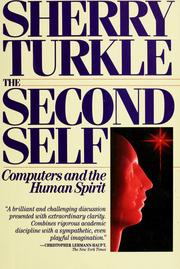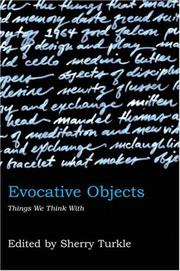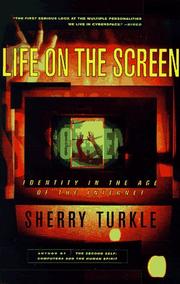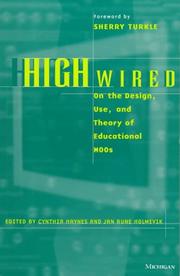| Listing 1 - 10 of 11 | << page >> |
Sort by
|

ISBN: 0671468480 9780671468484 Year: 1984 Publisher: New York Simon and Schuster
Abstract | Keywords | Export | Availability | Bookmark
 Loading...
Loading...Choose an application
- Reference Manager
- EndNote
- RefWorks (Direct export to RefWorks)
Computers --- Electronic data processing --- Ordinateurs --- Informatique --- Psychological aspects --- Aspect psychologique --- Computers. --- Psychological aspects. --- Electronic data processing - Psychological aspects

ISBN: 9780262201681 0262201682 9780262516778 0262516772 Year: 2007 Publisher: Cambridge (Mass.) MIT Press
Abstract | Keywords | Export | Availability | Bookmark
 Loading...
Loading...Choose an application
- Reference Manager
- EndNote
- RefWorks (Direct export to RefWorks)
In Evocative Objects, the author collects writings by scientists, humanists, artists, and designers that trace the power of everyday things. These essays reveal objects as emotional and intellectual companions that anchor memory, sustain relationships, and provoke new ideas
Transitional objects (Psychology) --- Objets transitionnels --- MAD-faculty 14 --- objecten --- psychologie --- designtheorie

ISBN: 026228524X 1435677285 9780262201766 0262201763 9780262285247 9781435677289 9780262516754 0262291568 Year: 2008 Publisher: Cambridge, Mass. MIT Press
Abstract | Keywords | Export | Availability | Bookmark
 Loading...
Loading...Choose an application
- Reference Manager
- EndNote
- RefWorks (Direct export to RefWorks)
"For more than two decades, in such landmark studies as The Second Self and Life on the Screen, Sherry Turkle has challenged our collective imagination with her insights about how technology enters our private worlds. In The Inner History of Devices, she describes her process, an approach that reveals how what we make is woven into our ways of seeing ourselves. She brings together three traditions of listening--that of the memoirist, the clinician, and the ethnographer. Each informs the others to compose an inner history of devices. We read about objects ranging from cell phones and video poker to prosthetic eyes, from Web sites and television to dialysis machines. In an introductory essay, Turkle makes the case for an "intimate ethnography" that challenges conventional wisdom. One personal computer owner tells Turkle: "This computer means everything to me. It's where I put my hope." Turkle explains that she began that conversation thinking she would learn how people put computers to work. By its end, her question has changed: "What was there about personal computers that offered such deep connection? What did a computer have that offered hope?" The Inner History of Devices teaches us to listen for the answer. In the memoirs, ethnographies, and clinical cases collected in this volume, we read about an American student who comes to terms with her conflicting identities as she contemplates a cell phone she used in Japan ("Tokyo sat trapped inside it"); a troubled patient who uses email both to criticize her therapist and to be reassured by her; a compulsive gambler who does not want to win steadily at video poker because a pattern of losing and winning keeps her more connected to the body of the machine. In these writings, we hear untold stories. We learn that received wisdom never goes far enough."
Technology --- Medical technology --- Computers --- Internet --- Psychological aspects. --- DARPA Internet --- Internet (Computer network) --- Health care technology --- Health technology --- Wide area networks (Computer networks) --- World Wide Web --- SCIENCE, TECHNOLOGY & SOCIETY/General

ISBN: 1282098608 9786612098604 0262285223 1435616537 9780262285223 9781435616530 9780262201681 0262201682 6612098600 9781282098602 0262291649 9780262516778 9780262291644 0262516772 Year: 2007 Publisher: Cambridge, Mass. MIT Press
Abstract | Keywords | Export | Availability | Bookmark
 Loading...
Loading...Choose an application
- Reference Manager
- EndNote
- RefWorks (Direct export to RefWorks)
Autobiographical essays, framed by two interpretive essays by the editor, describe the power of an object to evoke emotion and provoke thought: reflections on a cello, a laptop computer, a 1964 Ford Falcon, an apple, a mummy in a museum, and other "things-to-think-with.".
Transitional objects (Psychology) --- Attachment behavior. --- Behavior, Attachment --- Developmental psychology --- Love --- Attachment objects (Psychology) --- Objects, Transitional (Psychology) --- Solacing objects (Psychology) --- Transitional phenomena (Psychology) --- Psychology --- Attachment behavior

ISBN: 9780262285230 0262285231 9781435647909 1435647904 1282100122 9781282100121 9786612100123 6612100125 9780262201728 0262201720 0262293870 9780262516761 0262516764 Year: 2008 Publisher: Cambridge, Mass. MIT Press
Abstract | Keywords | Export | Availability | Bookmark
 Loading...
Loading...Choose an application
- Reference Manager
- EndNote
- RefWorks (Direct export to RefWorks)
Passion for objects and love for science: scientists and students reflect on how objects fired their scientific imaginations.
Science --- Engineering --- Technology --- Study and teaching

ISBN: 0684833484 9780684833484 Year: 1997 Publisher: New York (N.Y.) Touchstone
Abstract | Keywords | Export | Availability | Bookmark
 Loading...
Loading...Choose an application
- Reference Manager
- EndNote
- RefWorks (Direct export to RefWorks)
Book
Abstract | Keywords | Export | Availability | Bookmark
 Loading...
Loading...Choose an application
- Reference Manager
- EndNote
- RefWorks (Direct export to RefWorks)
Computers --- Electronic data processing --- Psychological aspects

ISBN: 047206665X Year: 1998 Publisher: Ann Arbor (Mich.) University of Michigan Press
Abstract | Keywords | Export | Availability | Bookmark
 Loading...
Loading...Choose an application
- Reference Manager
- EndNote
- RefWorks (Direct export to RefWorks)
Book
ISBN: 9781501737268 Year: 2019 Publisher: Ithaca, NY
Abstract | Keywords | Export | Availability | Bookmark
 Loading...
Loading...Choose an application
- Reference Manager
- EndNote
- RefWorks (Direct export to RefWorks)
Multi
ISBN: 9781501737268 Year: 2019 Publisher: Ithaca, N.Y. Cornell University Press
Abstract | Keywords | Export | Availability | Bookmark
 Loading...
Loading...Choose an application
- Reference Manager
- EndNote
- RefWorks (Direct export to RefWorks)
| Listing 1 - 10 of 11 | << page >> |
Sort by
|

 Search
Search Feedback
Feedback About UniCat
About UniCat  Help
Help News
News